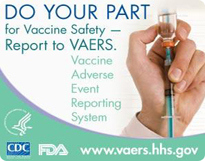Skip subpage navigation
 Immunizations are a cornerstone of the nation's efforts to protect people from a host of infectious diseases and are held to the highest standards of safety. The United States currently has the safest, most effective vaccine supply in history. Years of testing are required by law before a vaccine can be licensed. Once in use, vaccines are continually monitored for safety and effectiveness.
Immunizations are a cornerstone of the nation's efforts to protect people from a host of infectious diseases and are held to the highest standards of safety. The United States currently has the safest, most effective vaccine supply in history. Years of testing are required by law before a vaccine can be licensed. Once in use, vaccines are continually monitored for safety and effectiveness.
Like all medicines, there are side effects, or "adverse effects," associated with some vaccines, though they are generally rare or minor. Vaccines have mild side effects, such as pain, tenderness, or redness at the site of injection; and some have rare, but more serious, side effects. Anything that we put into our bodies (like vitamins or antibiotics) can have side effects, nothing is harmless. As health care workers it is our job to address the many myths and misinformation about vaccine safety that can confuse individuals who are trying to make sound health care decisions.
Understanding the proper treatment for a vaccine adverse reaction, procedures for reporting adverse events, and addressing the concerns of our beneficiaries is critical in providing excellent immunization healthcare.
For more information on specific adverse events, please click below:
You are leaving Health.mil
The appearance of hyperlinks does not constitute endorsement by the Department of Defense of non-U.S. Government sites or the information, products, or services contained therein. Although the Defense Health Agency may or may not use these sites as additional distribution channels for Department of Defense information, it does not exercise editorial control over all of the information that you may find at these locations. Such links are provided consistent with the stated purpose of this website.
You are leaving Health.mil
View the external links disclaimer.
Last Updated: January 10, 2025